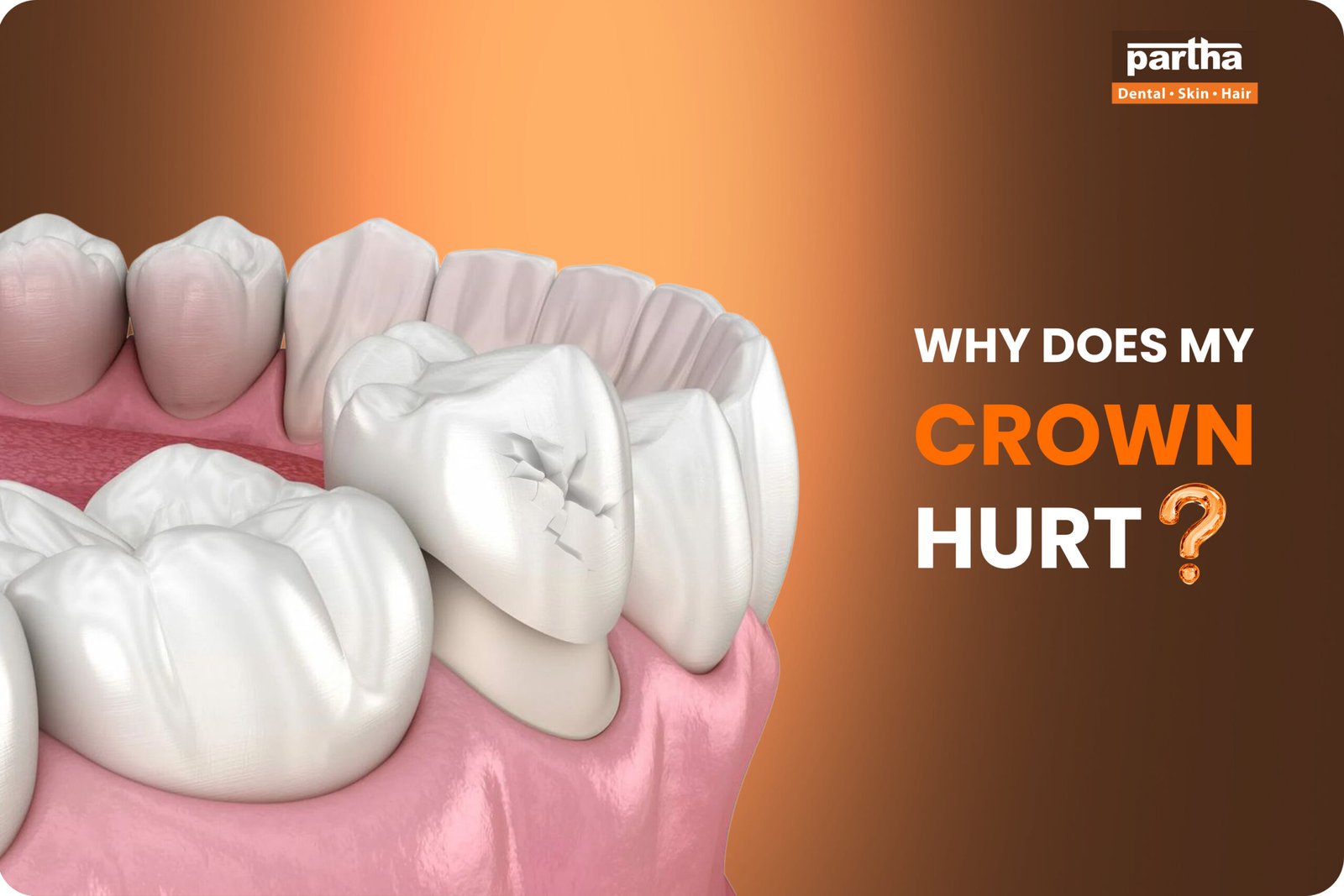If you’ve been lying awake, scratching your head over why your crown feels off – chill, it’s not like you’re getting dethroned.
Nobody’s taking away your royal status or anything.
We’re talking about that little cover on your tooth acting up for no clear reason.
Dental crowns ought to behave like your natural teeth’s reliable elder sibling – solid, protective, strong.
But sometimes, without warning, they act up. If things feel tender, chomping down brings pain, or a sudden zap zips through while chewing that makes you pause hard, don’t skip what comes next.
Here’s a peek into the reasons behind it, along with how your tooth could react. What to do next matters – so does spotting signs the crown might be failing. Timing plays a role too.
1. Why Does Top of My Head Hurt? Common Reasons Explained
Here’s the thing – let’s ditch the fuss and take it easy near that tender spot on your head.
Loads of things might be causing the pain, yet most? They’re fixable without too much hassle.
1. Your Crown Is Sitting Too High
When the bite feels off, your jaw notices straight away – sort of like wearing lopsided heels, only instead of feet hurting, your whole body begins to act up.
A high summit may cause: though it can also bring about:
- Pain while chewing
- A dull ache pulsed beneath the jaw, shifting unevenly with each breath
- Toothache hanging on way past its time
Fortunately, this fix takes no time at all. The dentist adjusts the way your teeth meet – suddenly, things start feeling right again.
2. Gum Inflammation around the Crown
If you’re brushing slow, while avoiding floss altogether – your gum by the crown could be puffed up.
Symptoms include:
- Red, swollen gums
- Bleeding when brushing
- Soreness right at the spot where gums touch teeth
Something even tough cleaning or better dental habits quickly sorts out.
3. Sensitivity after Cementation
Sometimes a new crown along with the stuff beneath acts like strangers shoved into the same room without knowing how to talk. As weeks go by, it gets easier.
Frozen or hot drinks might make your teeth tingle for a sec – though it usually settles quickly.
4. Cracks or Wear in the Crown
Crowns stick around awhile, though they won’t stay forever. If you clench at night, gnaw on ice or bite into tough candy, damage can happen.
A fractured crown doesn’t always show red flags – but sudden pain when biting down might sneak in.
5. There’s a Hidden Infection
If the tooth under the crown still has its nerve, it’s alive. So when stuff changes around it – say, swelling or shifting – it might start hurting out of nowhere
- Decay starts under the lid
- Trauma
- Bacterial leakage
This type of pain often throbs, keeps you awake, but flares up more when you’re lying down.
Book your free consultation today!
2. Crown Hurts 6 Months Later – Is That Normal?
You might think, “Okay, pain right after getting a crown makes sense. But why does my crown hurt 6 months later? That’s suspicious.”
That’s fair – but honestly, achiness lasting months can pop up now and then.
Reasons include:
- Receding gums expose sensitive areas.
- New decay under the lid – sweetness sneaks through slow.
- Teeth grinding, also known as bruxism, slowly erodes the covered tooth through repeated pressure.
- A shaky lid on old adhesive that’s finally giving up.
- Sinus issues – usually tied to upper molars.
Pain popping up weeks later probably isn’t an emergency, but it’s a sign – better get to the dentist soon.
3. Crown Failure Signs You Should Never Ignore
Dental crowns don’t last a lifetime – even if they do, they usually show signs before problems get worse.
Keep an eye on these obvious warnings that your crown might be failing:
1. Persistent Pain
A bit of gentleness makes sense – but here’s a twist, though: it stings instead
- Comes daily
- Gets worse
- Felt like a throbbing vibe or stiffness
- Might signal a cracked crown or an issue below.
2. Loose Crown
If your cap wiggles, slides higher, or you spot a gap when pressing with your tongue – yep, it’s about to quit.
Once that occurs, the crown is already breaking down.
3. Bad Odor or Unpleasant Taste
Fair heads-up – usually its bacteria setting up camp under your hat like uninvited guests.
4. Visible Crack or Dark Line at the Gum
A chip or a cracked corner? That spells problems. Don’t wait around – have a look at it now.
Failed Dental Crown: What Happens When Things Go Wrong
Here’s the deal – crowns sometimes fail. True story. It’s not bad luck or some curse on your teeth. Usually, the reason is stuff like:
1. Poor Fit
A small gap is all it takes for bugs to sneak in – silent, quick.
2. Recurrent Decay
Sugar over time causes decay. Decay under a cap works like bugs in timber – quiet, but destroying stuff from the inside.
3. Root Canal Failure
If a tooth had root work before being capped, an old infection could flare up later – keep an eye out for symptoms.
4. Old Age of the Crown
Crowns tend to last ten years or even longer. If your crown’s been in place past that point, it might simply be tired.
Doing its duty year after year. Handling everyday pressure without fuss.
4. Why Dental Crowns Fail (And How You Can Prevent It)
Here’s the deal – why do crowns fail? We’ll break it down real quick.
Crowns break down mostly due to:
- Bad oral hygiene
- Grinding habits
- Odd cap form or trouble biting
- Fissures from chomping hard snacks
- Neglected dental checkups
Prevention Tips:
- Brush twice daily – your dentist ain’t cutting slack for weak excuses.
- Floss daily – yes, each day, not only when bits are stuck between teeth.
- Use a mouth guard at night if you grind your teeth.
- Visit your dentist every six months.
- Your head will feel mighty grateful.
5. Treatment Options When a Crown Hurts
Depending on what’s causing the unease, attention could include:
Bite adjustment
- Fast support without drama.
- Cleaning teeth but also taking care of gums
- Your gums will feel less irritated soon after that.
- Replace the worn-out top piece
- If something’s cracked or sits wrong, maybe try swapping it out for a new one.
Root canal therapy
If a nerve’s infected, fixing it means a root canal.
Night guard
- Stop the grinding caused by squeezing your teeth at night.
- Medicines like these only help when germs are actually around
- Fine for now, but still far from done.
The faster you visit a tooth doctor, that’s when things start feeling easier.
When Should You See a Dentist?
Get in touch today to book your appointment fast if you’re facing:
- Pain hanging on beyond forty-eight hours.
- Sensitivity’s been growing sharper lately
- A cracked lid or one that shakes loose.
- Warmth or a throbbing sensation could signal that bacteria are moving in.
- Funky odor or taste near the top.
Head over to Partha Dental. We’ll check it out, sort things quietly, or make sure your crown fits perfectly once more – no stress, just solid fixes. Call us now 04041420000 to book an appointment!
6. Frequently asked questions
Sometimes the ache hits hard – like a tear or puffiness. Then again, now and then, just a tiny tweak does the trick.
Pain popping up way later? Might be your gums pulling back, decay sneaking under the crown, or perhaps you’re grinding your teeth like crazy.
Look out for pain, puffiness, cracks, bad odor, also redness in your gums.
Your dentist could replace the crown, deal with decay, or opt for a root canal – depending on what’s needed.
No. When cared for properly, they tend to last ten years or longer.
True. When your gums move around, teeth start fitting differently, or decay kicks in, pain can pop up even when everything felt okay before.
Hold up – minor pains could turn into bigger issues. Maybe get it checked out, just in case. Read more.
Dental Questions? We’re here to help!
Disclaimer:
The prices mentioned in this blog are indicative and may vary based on the severity of the condition, technology used, and materials suggested by the Dentist. They are accurate as of the date of publishing and subject to change as per clinic policy. Third-party or AI-generated estimates may not reflect actual clinic pricing. For accurate costs, please visit your nearest Partha Dental clinic.




